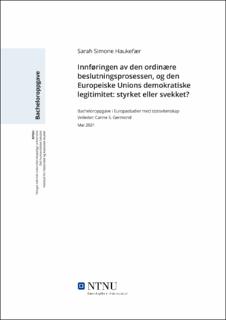| dc.contributor.advisor | Germond, Carine S. | |
| dc.contributor.author | Haukefær, Sarah Simone. | |
| dc.date.accessioned | 2021-09-13T16:08:22Z | |
| dc.date.available | 2021-09-13T16:08:22Z | |
| dc.date.issued | 2021 | |
| dc.identifier | no.ntnu:inspera:80491188:45900521 | |
| dc.identifier.uri | https://hdl.handle.net/11250/2775732 | |
| dc.description.abstract | Sammendrag:
Hvordan har innføringen av den ordinære beslutningsprosessen (OLP) påvirket den Europeiske Unions (EU) demokratiske legitimitet? Før 2009 vedtok Ministerrådet lover enerådende, men etter iverksettelsen av den ordinære beslutningsprosessen (OLP) som kom med Lisboa-traktaten i 2009, var ikke dette tilfellet lenger. Innføringen av EP som medlovgiver var en del av demokratiseringen av EU, og EPs historie viser hvordan dets rolle har forandret seg etter innføringen av OLP. Demokratisk legitimitet og debatten om det demokratiske underskuddet er linket sammen. Hvordan? Hva er argumentene i denne debatten, og hvilken styreform en kan diskutere at EU har? Før ble ikke legitimiteten til den europeiske politikken sett på som et problem, men da EU fikk flere rettigheter og beslutningsomfanget deres økte, startet problematikken. Begrepet demokratisk legitimitet krever en definisjon for å kunne konseptualiseres og anvendes. Begrepet kan deles inn i tre; input, output og throughput - legitimitet. Ved hjelp av Vivian A. Schmidts forklaringsmodell om hvordan de tre begrepene henger sammen, vurderer denne oppgaven hvordan EUs demokratiske legitimitet har blitt påvirket av OLP-prosessens innføring. Det ønskes å finne ut av og undersøke hvordan å innføre en medbestemmelsesprosedyre kan ha endret EUs demokratiske legitimitet, gjennom å diskutere EUs input-, output- og throughput – legitimitet. | |
| dc.description.abstract | Abstract:
How has the introduction of the ordinary legislative procedure (OLP) affected the democratic legitimacy of the European Union (EU)? Before 2009, the Council of Ministers adopted laws unanimously, but after the implementation of the ordinary legislative procedure (OLP) which came with the Lisbon Treaty in 2009, this was no longer the case. The introduction of the EP as co-legislator was part of the democratization of the EU, and the EP's history shows how its role has changed since the introduction of the OLP. Democratic legitimacy and the debate on the democratic deficit are linked. How? What are the arguments in this debate, and what form of government can one discuss that the EU has? Before, the legitimacy of European policy was not seen as a problem, but when the EU gained more rights and their decision-making scope increased, the problems started. The concept of democratic legitimacy requires a definition in order to be conceptualized and used. The term can be divided into three; input, output and throughput - legitimacy. Using Vivian A. Schmidt's explanatory model of how the three concepts are related, this thesis assesses how the EU's democratic legitimacy has been affected by the introduction of the OLP-procedure. It is desired to find out and investigate how the introduction of a co-determination procedure may have changed the EU's democratic legitimacy, by discussing the EU's input, output and throughput legitimacy. | |
| dc.language | nob | |
| dc.publisher | NTNU | |
| dc.title | Innføringen av den ordinære beslutningsprosessen, og den Europeiske Unions demokratiske legitimitet: styrket eller svekket? | |
| dc.type | Bachelor thesis | |
